- Home
- Marjorie Farrell
Desert Hearts Page 2
Desert Hearts Read online
Page 2
“Lizzie stuck her tongue at me, Mama,” cried Jonathan, moving off to where their mother was unpacking the pots and pans.
“Lizzie” indeed. She hated it when he called her that and he knew it and she was almost ready to turn back and box his ears for telling, but she was almost down the hill to the creek by now.
It was a lovely warm evening and the creek ran happily over the rocks. Elizabeth Jane pulled off her stockings and waded in. She had to admit that squishing her hot toes in cool red mud felt good and was something you couldn’t do in Boston.
All was still except for the creek running and the sound of her father’s voice.
“Oh, sa-ay, will you go out West wi—”
Elizabeth Jane heard a sharp crack at the same time her father stopped singing. Had he snapped a branch for the fire? Then she heard Jonathan scream. And then her mother. She stood paralyzed in the cold running water. Jonathan was yelling, “Mama, Papa! Let me go!” Mama was crying and saying, “No, please, no.”
Elizabeth Jane put the bucket down very carefully at the edge of the creek and, lying flat on her stomach, crawled up the bank. Papa was lying near the fire and red stain had blossomed on his white shirt like a great rose. There were six or seven of them. They weren’t Indians, they were white men. Maybe some were Spanish, thought Elizabeth Jane, registering black hair and knee breeches. She could smell them from here, or maybe that was her imagination. She could smell the whiskey. That was not her imagination. They were passing a jug around, three of them. Another was tying Jonathan to the back of a mule. He was very still, but surety he was still alive if they were bothering to take him? Then she saw Mama and wished she hadn’t. The other three men had her on the ground and were doing something to her. Her skirts were up and at first she screamed, “No, no” as each man got on top of her and did whatever he was doing to her. Then one of the others came over and shot her through the head. “That’ll shut her up,” he said.
Mama lay there staring up at the sky, her skirts around her waist, her most private parts exposed. Elizabeth Jane slid a few feet back down the hill and lay there trembling and nauseous. If they came for water, they would see her and tie her to a mule. Or maybe, since she was almost a woman, they would do to her what they had done to Mama.
She heard them going through the pots and pans and tins in the wagon. Looking for jewelry and money, she guessed. She heard one cursing, “Goddamn pins and needles,” and pictured him opening Mama’s sewing box. That seemed more of a violation than anything. With her eyes closed, she could see the small rosewood box, silk threads carefully laid out, pins in the small blue velvet pin cushion and needles in the oblong tin needle case.
She lay still for a long time. She had to relieve herself very badly, but couldn’t even squirm to distract herself. Finally she had to let go and could feel her legs go warm with her own water, and then cold.
Even after she heard them leave, she lay there. What if one of them had stayed behind and was watching? Finally she had to get up. It was getting dark, but at least the moon would be full in a day or so, and as it rose, it gave her enough light to make her way to the wagon.
She didn’t look at her father or mother. Instead, she crawled into the ransacked wagon and pulled a quilt around her. She couldn’t stop shaking for hours, and slept only fitfully in the last hours before dawn. When she awoke, she was disoriented. She could smell coffee as usual, but it was close and strong, not wafting in from the campfire where Mama was cooking breakfast. Then she realized the smell was coming from the bed of the wagon, where coffee, sugar, and beans were all spilled together.
“Mama, Papa,” she whispered, and climbed down.
It was a beautiful morning. Cool, as it always was before the sun was fully up, and the greens of the sage and grass and cottonwoods by the creek were lit from the inside by the clear light of morning. Everything shone pure. It was like waking up to the first morning of the world.
Until she looked over at her father. The rose on his chest was no longer crimson, but brown and black. Both her parents’ eyes were open, and that was wrong. Elizabeth Jane knew someone should smooth their eyes closed. She looked around, as if to ask for help, but of course she was the only someone there. She walked to her father first and drew her hand over his eyes. When she turned to her mother, she realized Helen Rush’s thighs were smeared with reddish brown blood and Elizabeth Jane pulled her mother’s skirts down quickly before she brushed gently at her face.
Then she stood there and let the sun come up. What else could she do? She tried to stop it. She closed her eyes and willed it to stay low in the sky, willed time to stop. The sun had no business rising and bathing everything in its clear light. The sun had no right to make such a morning. How could it rise on such horror?
She was very thirsty and she stumbled down the hill to the creek, picking up the wooden bucket from the bank. What if Mama had given in to her? Would Jonathan be alive? And she tied to the back of a mule? She splashed water on her face and on her legs, which were sticky from wetting herself, and then climbed up the hill again.
She had nothing to do. She had nowhere to go. So she just sat against the wagon wheel and watched the sun climb higher in the sky and listened as the flies began to buzz around her parents’ bodies.
* * * *
A day later the soldiers found her. It took them a few minutes to get through the buzzing, for the flies seemed to have moved inside her head and were all she could hear.
“This one’s alive, Lieutenant.”
Lieutenant Thomas Woolcott dismounted and walked over to kneel beside the girl. Her eyes opened when he touched her arm. She seemed to be looking at him, but he wasn’t sure if she was seeing him.
“Are you hurt anywhere, miss,” he asked gently.
The girl seemed to be listening the way she was looking; she was there and not there at the same time.
“She’s in shock, Lieutenant. I’ve seen it before after an Indian raid.”
“This wasn’t no Indians,” said their scout, who was walking around carefully. “Boots, not moccasins, for one thing. And we’re too far from the Navajo, and the Jicarilla haven’t done any raiding for the past year. Comancheros, from the look of things. Worse than any tribe I know.”
Elizabeth Jane started shivering when she saw one of the soldiers approach her mother’s body. Lieutenant Woolcott moved himself in front of her and rubbed her back rhythmically. “Get me something to put over her,” he whispered to the trooper standing closest to him.
The man found a wool shawl in the wagon and Woolcott draped it over Elizabeth Jane’s shoulders.
It was Mama’s best shawl and it smelled like her: a combination of milled soap and rosewater cologne. It was the scent of roses that did it. It brought her mother to life and Elizabeth Jane could hear her voice, see her dabbing the cologne behind her ears. Great wrenching sobs racked her and the lieutenant wrapped his arms around her.
“That’s the way, miss. Just let it all out.”
She cried until she had no more tears and then she slept. By the time she awoke, it was dark and the fire was lit. She looked around for her father and then remembered; her parents were dead, her brother gone, and the soldiers were here to keep her safe.
The bodies were gone, she realized. She saw the lieutenant studying the fire, a cup of coffee in his hand, and she pulled herself up and went over to him.
“You are awake then, miss,” he said kindly.
“Yes, sir. My name is Rush. Elizabeth Jane Rush.”
“Well, Elizabeth Jane Rush, you have had a hard time of it. Where was your family headed? Do you have any relatives in the territory?”
“We left everyone behind, Captain. We were headed for Arizona by way of Santa Fe.”
“Only ‘Lieutenant,’ ” he corrected her with a smile. “Lieutenant Thomas Woolcott. Where are you from, Miss Rush?”
“Boston.”
“And do you have family there?”
“Only my grandfather.”
/>
“Then we will see you safe into Santa Fe and make sure you get back home.”
“Oh, no, I don’t want to go back to Grandfather’s,” she said immediately. “He wouldn’t know what to do with me. And he wasn’t very happy with Papa when we left.”
“Hmmmm.” Thomas Woolcott looked down at the girl by his side. She was over the initial shock, he could tell, and seemed to know what she didn’t want to do. “But where will you go, Miss Rush? You are only a girl.”
“I am fourteen, Lieutenant. Really almost a young lady.”
“Santa Fe is hardly the place for a young lady from back East.”
“Isn’t there some school where I could work? Or seam-stressing? I can sew very well, Lieutenant.”
She was almost grown, thought Thomas Woolcott, having felt her soft curves when he had pulled her to his side to comfort her. He was ashamed of himself for even thinking about a fourteen-year-old that way, but there was something about the way she had composed herself and was trying to deal calmly with the horror that life had handed her that drew him.
“I have a sister in Santa Fe, Miss Rush. She is a widow with three small children and from what I’ve seen of them, could use some help. I could see if Nellie could take you in and you could try it out for a while. Then, if you change your mind, I can see that you get back to Boston.”
Elizabeth Jane turned to him, her eyes full of relief and gratitude. “Thank you very much, Lieutenant Woolcott. If your sister is willing, I would like to stay with her.”
* * * *
The next morning at dawn, he found her standing by the two mounds that were her parents’ graves.
“I think Papa went quickly,” she whispered.
“It seemed so.”
“But Mama….” He could feel her whole body tremble as her voice died away.
“Don’t think about it, Miss Rush. Your mama is at peace now.”
“And Jonathan? Will you be able to find him?”
The lieutenant hesitated. “I only have a few men with me and I need them all to get you to Santa Fe. I can’t go after those bast…excuse me, those villains. But I will send someone out as soon as I report back to the fort.” Not that they’ll be likely to find him, he thought. He’ll be some Mexican family’s slave by then, and impossible to find.
“He is only seven. What would they want with him?”
Thomas Woolcott cleared his throat. “There’s raiding back and forth between Indians and New Mexicans for slaves, Miss Rush. Likely the Comancheros will sell him to some household where he’ll be set to hauling water and chopping wood and such. He’ll work hard, but he’ll stay alive.”
The girl was very still and when Woolcott looked down he knew she was crying again, this time noiselessly. “I…the last thing I said…I stuck my tongue out at him and we wrangled like we always do….” Her voice broke. “But he is only a little boy, Lieutenant.”
“I know, miss, I know.” He waited until her tears had stopped. “It is time to say good-bye, Miss Rush.”
Elizabeth Jane knelt down and said a short prayer. He could hear her whispering a good-bye to her mother and father and then one to her brother. He wanted to run his hand over her hair as she knelt there, but restrained himself. This was surely too hard a country to live in, he thought to himself, and not for the first time.
Chapter One
New Mexico Territory, 1863
Michael dismounted slowly and stiffly. After a month in the saddle even he, an experienced cavalryman, was happy to be almost at his destination.
“We are here, boyo, or almost,” he added as he loosened the girths on Trooper and Frost.
At first he had thought that the green meadows in the distance must be a new kind of mirage. Certainly he’d seen enough “water” not to be fooled again. But the meadow was at the mouth of a canyon and Fort Defiance had been built near Canon Bonito to take advantage of the water and grass. So it was real. No mirage.
When they smelled the water, the two horses picked up their heads and Trooper nudged Michael between the shoulders, as if to say, “Come on yerself, boyo, all that green grass is waiting.” And when they reached the first canyon spring, Michael was on his hands and knees, about to drink with his horses, when he saw them: the prayer sticks with feathers and the pieces of turquoise at the bottom of the clear pool.
Pulling himself away was almost as hard as getting his horses to move, but he cursed them in a friendly way and pulled them further downstream. The spring was obviously a shrine of some sort and he didn’t want to disturb it.
* * * *
“Will I see Indians, sor, if I join the cavalry?” he had asked the recruiting sergeant with open-eyed eagerness. The sergeant had laughed. “You’ll see Indians, son, I promise you that. And you’d better pray that you see them before they see you. Now put your ‘X’ right here, Paddy.”
“My name isn’t Paddy, sor, it is Michael Joseph Burke,” he had said slowly and with dignity. “And I can write me own name.”
“Oh, ‘tis an eddicated mick? Well, Mickey Joe, you are in the U.S. Army now,” said the sergeant, folding up the enlistment papers.
Michael winced at “Mickey Joe.” Only Cait had called him that. But he would not think of Cait or Da or any of them now. He was going West and he would see Indians.
He had seen them, of course. More at the end of his rifle than he’d wanted or expected to. He had been so young. Believed that joining the cavalry meant helping to protect the rights of both natives and settlers. Meant being a peacekeeper. Instead, more often than not, he’d been a war starter. But he’d seen and come to know many Indians since then: Sioux, Cheyenne, Crow. And now, here he was in the New Mexico Territory, about to meet Navajo. Or more than likely, he thought cynically, about to fight Navajo.
The descending trill of a canyon wren brought him back to the present. His horses had drunk their fill and were munching grass contentedly. He was dressed in his greasy buckskins and filthy shirt less than an hour from his new post. He stripped quickly and plunged into the stream, wading up canyon toward the next pool, where he was going to enjoy a long and thorough soak.
* * * *
Elizabeth was going to try again. For two years she had been walking out from the fort to the mouth of the canyon, attempting to capture the color of the sandstone cliffs. But the color changed from day to day, moment to moment. It seemed that she could dip her brush in ochre and look up and see that the canyon walls were just a little bit lighter, or had a tinge of coral that she had missed. And so they pulled her back, again and again, frustrating and satisfying her at the same time.
She passed the shrine, curious as always about the sticks and stone piles around it. She walked slowly, loving the feel of the warm pink sand under her shoes and smiling when a lizard flickered across her path. She was not paying close attention to anything but the path when she heard a loud splash and, startled, jumped behind the nearest sagebrush and crouched down, her heart gone wild in her chest.
It had been quiet around the fort for months, so she didn’t think she was in any danger from hostiles. And anyway, no Navajo would make that much noise? She finally got the courage to stick her head out from behind the bush. A man was sitting there in the pool a little ways ahead of her, stark naked, splashing away as casually as though he were in his own bath, she thought. It didn’t look like anyone she knew from the fort, but then, she thought, she had never seen anyone from the fort but her husband in the bath. And this man looked nothing like her husband from behind; he had thick black hair and muscular shoulders and, oh my God, he was standing up, a very white behind. He looked like a piebald, with his brown neck, tan torso, and white legs covered with more black hair. She made herself close her eyes. What on earth was she doing, ogling a man’s body? She was a virtuous, married woman and had never desired anyone but her husband. No, she thought with familiar sadness, that wasn’t really true. She had never desired even her husband.
She didn’t desire this man either, that was the
truth. But as an artist, she did appreciate natural beauty, and despite the odd distribution of suntan, she could see that this man had a body that someone like Michelangelo would have loved to sculpt or paint. It was unfortunate that she would have to sneak away…that she could not just sit down and sketch.
She backed away carefully, praying fervently that he wouldn’t turn and see her. She shivered with sudden fear. She had been so intent on the abstract, physical beauty of his body that she only now was worrying about what that body could do to her. At the fort, she was Mrs. Woolcott, wife to Lieutenant Thomas Woolcott and protected by her position. Here, alone, she was no one. With his dark hair, he might be a Comanchero…. She took a deep breath. Calm yourself, Elizabeth Jane Woolcott, she scolded. He has not seen you. He is no doubt passing through. And you are not in danger, not so close to the fort, or your husband wouldn’t allow you outside the gates.
It was usually a half-hour walk, but she made it in twenty minutes, flushed and dripping with perspiration. When the sentry asked if she was all right, she just nodded and said quickly that the sun had felt too hot today to stay any longer.
A half hour later, she looked up from the sketches she was making and crumpling, sketches of a strong back and solid curved buttocks. There was a stir outside and she stuffed the papers in the kitchen stove and went to her door to see what was going on.
A trooper was walking by, on his way to the enlisted men’s barracks. A tall man, his curly black hair slicked down. Mrs. Taggert moved from her front door over to Elizabeth’s. “That’s the new master sergeant, Mrs. Woolcott. Come all the way from Utah. Sergeant Burke.”
As though he had heard his name, the new man looked up and flashed a smile at the ladies. His eyes, a startling blue in his tan face, seemed to be saying, “Aren’t I the handsome charming devil that all the ladies love.”
“Oh, another Irishman,” said Elizabeth dismissively and loud enough for Michael to hear. “Full of himself, no doubt, and full of whiskey on payday.”
Michael flushed with embarrassment and anger as he continued walking. He hadn’t heard those tones in a long time: the fine eastern lady, the damned English prejudice no matter how American they considered themselves. He couldn’t help smiling at women. It was so good to see one out here. Especially a pretty one like her. But she was one pretty one he would be happy to avoid. And since she was clearly an officer’s daughter or sister, it would be easy enough.

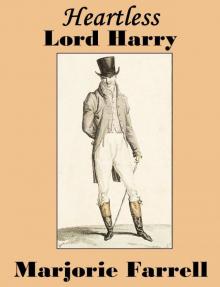 Heartless Lord Harry
Heartless Lord Harry Journey of the Heart
Journey of the Heart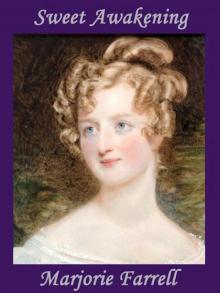 Sweet Awakening
Sweet Awakening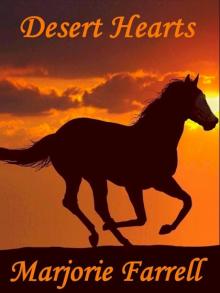 Desert Hearts
Desert Hearts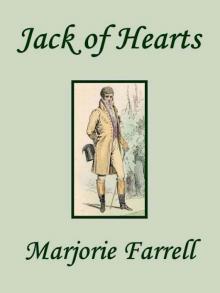 Jack of Hearts
Jack of Hearts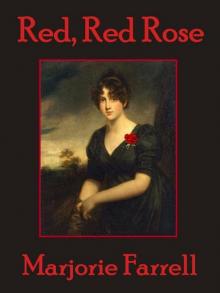 Red, Red Rose
Red, Red Rose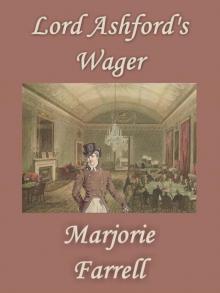 Lord Ashford's Wager
Lord Ashford's Wager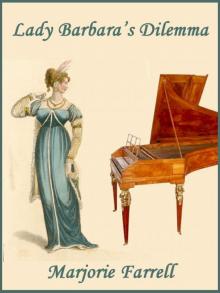 Lady Barbara's Dilemma
Lady Barbara's Dilemma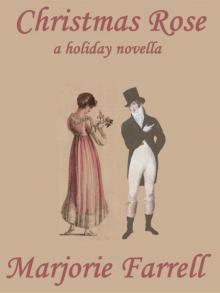 Christmas Rose
Christmas Rose